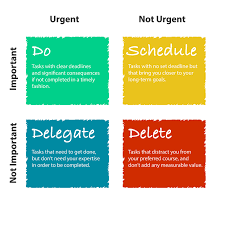As a parent, you want to see your child thrive both academically and personally. One of the key ingredients to academic success is mastering time management. When students learn to manage their time, they not only stay on top of their school work but also reduce the stress that comes with multiple tasks.
By teaching your child time management, you're not just helping them get better grades. You're also giving them more free time for hobbies and helping them develop the right mindset. Let’s explore 10 practical time management tips that can help students make the most of their time!
1. Set Clear Goals

The first step to effective time management is setting clear academic goals. Encourage your child to set goals, such as finishing their homework for the week and aiming to improve their grades by the end of each term.
When students have a clear vision of what they want to achieve, they can stay focused and motivated. Breaking these larger goals into smaller, manageable tasks is key. By taking one step at a time, all tasks feel less massive, making it easier for them to stay on track and meet deadlines.
2. Use Time-Blocking

Time-blocking is a technique that can help students manage their day more efficiently. This involves setting specific hours for different activities. For example, your child can dedicate 3:00 to 4:30 p.m. for homework, followed by a break for outdoor play or relaxation.
By setting up time blocks for studying, students can stay focused because they know how long they have for each task. It also helps reduce the urge to procrastinate since the day is already planned out. This approach ensures that they’re not only productive but also have time for fun and relaxation.
3. Organize Tasks Using the Eisenhower Matrix

The Eisenhower Matrix is a tool for managing tasks based on urgency and importance. It helps students decide what needs immediate attention and what can be postponed or even eliminated. The matrix is divided into four categories:
- Urgent and Important: Tasks that need immediate action. For example, studying for tomorrow’s test or completing an assignment due soon.
- Important but Not Urgent: Long-term projects or studying for future exams. These tasks contribute most to academic success and should be planned carefully.
- Urgent but Not Important: Tasks like responding to messages or last-minute requests. These can often be delegated or handled quickly without much focus.
- Not Urgent and Not Important: Activities like excessive social media scrolling. These should be minimized or eliminated to free up more productive time.
4. Use the Pomodoro Technique

The Pomodoro Technique is a simple and effective time management tool. It helps students maintain focus and avoid being exhausted. It involves working in short, focused intervals—usually 25 minutes—called "Pomodoros," followed by a 5-minute break. After completing four Pomodoros, a longer break of 15-30 minutes is taken.
This technique helps students maintain concentration by breaking study sessions into manageable chunks. The frequent breaks allow them to recharge and stay energized without feeling overwhelmed. Encourage your child to use this technique during homework or study sessions.
5. Adding Buffer Times

Incorporating buffer times between tasks is crucial for effective time management. Buffer times are short breaks or extra minutes you add between activities to handle unexpected delays or just take a quick rest. For example, scheduling a 10-15 minute break between homework sessions or after each activity. It can help if a task takes longer than planned.
Adding this method helps students to keep their schedules, and avoid getting stressed. This added time ensures that they’re not rushing from one task to the next, helping them stay calm and more focused throughout the day.
6. Create a Routine

A structured routine creates a sense of stability, ensuring there’s a balance between study, personal time, and relaxation. Consistency helps students stay on track with their academic tasks while also making time for breaks and fun activities.
When making a routine, encourage your child to create it around their productive hour. For example, if they focus better in the morning, they should plan their study sessions for that time and save the afternoon for other activities.
7. Keep Your Digital and Physical Space Organized

Staying organized, both digitally and physically, is essential for effective time management. Encourage your child to keep their study materials well-organized so they can easily access what they need. This includes organizing digital files into folders and using apps or tools to track assignments and deadlines.
A clutter-free workspace also plays a significant role in enhancing focus and efficiency. Help your child create a clean, tidy study environment where everything has its place. By reducing distractions, they’ll be able to concentrate better and complete tasks more efficiently.
8. Avoid Multitasking

While it may seem like multitasking can help students get more done, it often leads to reduced productivity and more mistakes. Juggling several tasks at once can lead to errors and slower progress. Instead, encourage your child to focus on one task at a time. Completing each task with full concentration not only leads to better work but also allows them to finish tasks faster.
9. Seek Accountability

Having someone to hold you accountable can greatly improve time management. Encourage your child to find a study buddy or join a study group where they can motivate each other and stay on track with their academic goals. Working with others makes the process more engaging and helps build a sense of responsibility.
Setting goals together and tracking progress can make students more motivated and keep them committed. Regular check-ins with a study buddy also offer chances for support, which helps them stay focused and succeed in their studies.
10. Review and Reflect on Weekly

Weekly reviews are crucial for staying on top of academic tasks and improving time management skills. Encourage your child to set aside time each week to look back on what they’ve done, see what went well, and figure out any challenges they faced. This process helps them understand how effectively they’re managing their time and where adjustments might be needed. By regularly reviewing and reflecting, they can adapt their schedule to better suit their needs.
Conclusion
Mastering time management is essential for a balanced and successful academic life. By implementing these strategies students can create a more productive and less stressful learning experience.
Encourage students to experiment with these techniques and find what works best for them. Personalizing their time management approach based on their unique needs and preferences will help them stay motivated and achieve their academic goals. With a little trial and adjustment, they’ll be well on their way to mastering their time and excelling in their studies.


















